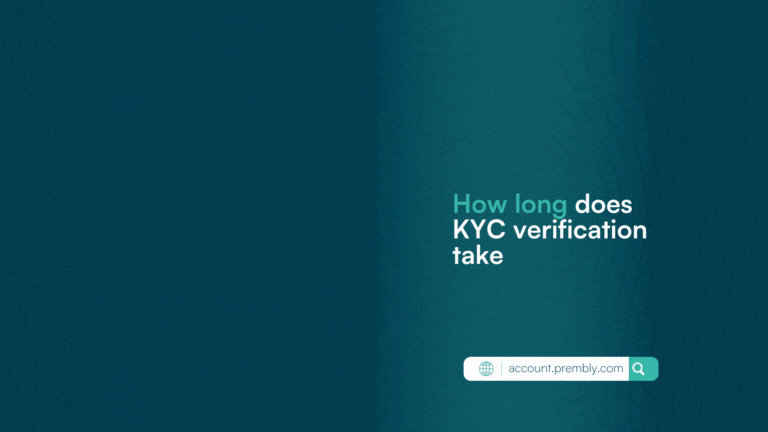1. What does KYC mean?
KYC stands for Know Your Customer in Kenya. It is the process where businesses, especially financial institutions, verify the identity of their customers to ensure they are legitimate. KYC helps prevent illegal activities like money laundering, identity theft, and fraud.
2. What are KYC documents in Kenya?
In Kenya, the most common KYC documents required for verification include:
- National ID card or passport (for identity verification).
- Proof of address (utility bills, rental agreements).
- Kenya Revenue Authority (KRA) PIN certificate for tax verification.
- Company registration documents (for corporate clients).
Prembly KYC platform offers an all in one verification.
3. How to do KYC verification?

KYC verification involves several steps:
- Submit your identification documents: Provide a government-issued ID (e.g., National ID or passport) and proof of address.
- Provide additional details: This may include tax information like your KRA PIN and, for businesses, company registration documents.
- Verification process: The institution cross-checks the details provided with official databases to ensure authenticity.
- Approval or follow-up: If the information is correct, the system approves your KYC verification. If discrepancies are found, you may need to provide additional documents.
Prembly’s KYC verification system simplifies this process by automating the entire process of KYC Verification.
4. What are the three components of KYC?
- Customer Identification: Verifying the identity of customers through documentation.
- Customer Due Diligence (CDD): Assessing the risk of doing business with the customer.
- Ongoing Monitoring: Continuously monitoring transactions to detect suspicious activities.
5. What are KYC requirements?
KYC requirements vary by institution, generally, customers must provide proof of identity (e.g., National ID, passport), Proof of address (e.g., utility bill, lease agreement), Tax information (e.g., KRA PIN for individuals and businesses in Kenya), Business registration documents (for corporate clients).
These requirements ensure institutions comply with regulations and mitigate risks.
6. How long does KYC verification take?

KYC verification timelines vary depending on the institution and method used. With automated Prembly KYC verification system, they can be completed within a few seconds to few minutes.
7. How do I pass KYC verification?
To pass KYC verification:
- Submit accurate and valid documents.
- Ensure your details match across all documents and where necessary, provide evidence of discrepancies.
- Provide clear copies of your ID and proof of address.
- Follow all instructions and guidelines carefully.
8. How do I know if my KYC is approved?
The institution may send you a confirmation email or message informing you that your KYC has been approved. If the verification is not successful, they will notify you about the next steps to ensure your KYC is approved.
9. Why is my bank asking for KYC?
Banks request KYC information to:
- Ensure your identity.
- Comply with legal regulations.
- Prevent fraud and money laundering.
- Assess risk and make informed decisions about offering services.
10. Why does the bank ask for my KRA PIN?
The bank requests your KRA PIN to comply with regulations aimed at preventing KRA revenue loses and identifying tax evasion. The Central Bank of Kenya has mandated all commercial banks to collect KRA PINs from both new and existing account holders as part of the Know Your Customer (KYC) policy.
11. Can I do KYC Know Your Customer in Kenya online?
Yes, many institutions allow customers to complete KYC online. Prembly enable fast, secure online KYC verification without the need for physical paperwork.
12. What happens if a bank account doesn’t complete KYC?
If you do not complete KYC for your bank account::
- The bank may freeze or limit your account.
- You may not be able to access certain services, such as transfers or withdrawals.
- The bank may close your account after a certain period of non-compliance.
13. Is KYC compulsory for bank accounts?
Yes, KYC is compulsory for bank accounts. Introduced under the Banking Act in the laws of Kenya in January 2006. It is a regulatory requirement to verify customer identities and prevent illegal activities like money laundering.
KYC is essential for securing financial systems and ensuring compliance with regulations. To make your KYC process smoother and quick and accurate, sign up for Prembly’s KYC verification platform. For all your Know Your Customer checks in Kenya and beyond.
Discover Prembly KYC WordPress Plugin
#Prembly #KYC #KYB #Backgroundcheck







